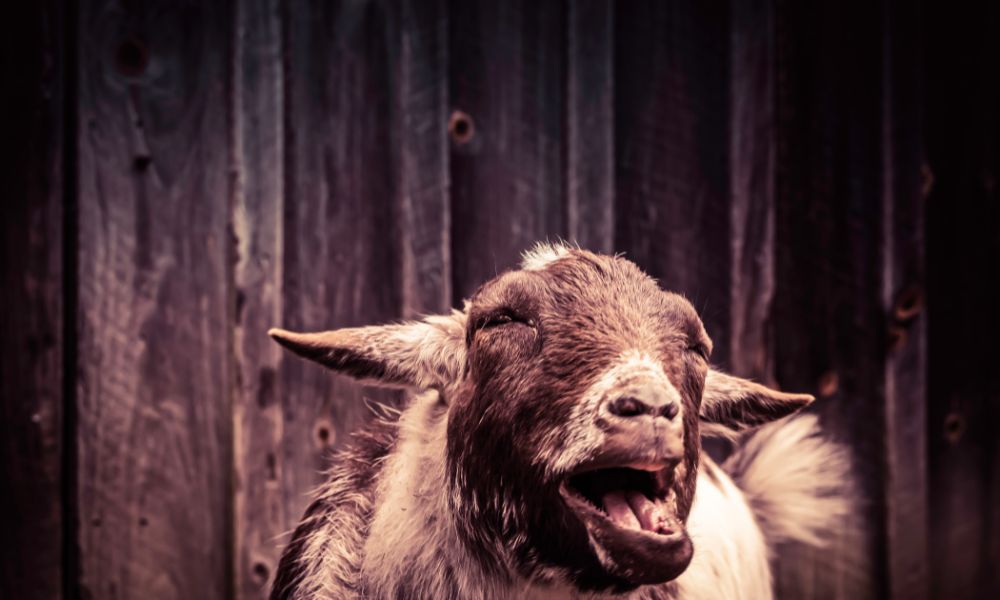Yawning is an age-old reflex among humans.
We begin yawning in our mother’s womb when we have been growing for just 11 weeks, and we will continue doing so for the rest of our lives.
Goats like to yawn too, and you’ll see that it’s for very similar reasons that we do.
If you’re still concerned about your goat yawning too much, consult a vet for some guidance.

What does a goat’s yawn look like?
Different goats will yawn differently, but their yawns are usually similar to humans’ yawns.
When a goat yawns, it will close its eyes, open its mouth, and may even let out a yawn sound for a few seconds.
This yawn sound can be either a high-pitched wail or a low-pitched grumble depending on the goat.
Some goats stick out their tongues too.
A goat’s yawn is a very comical thing to experience.
Goat yawns being just a little off compared to our own will surely bring out a laugh or two when you see them.
Why do goats yawn?
Yawning is a typical action many mammals do to bring more oxygen into their lungs.
When the animal is tired or sleepy, its breathing shallows and a yawn is needed to increase blood oxygen levels before they get too low.
A yawn also signals to others that the animal is tired and likely will go sleep soon.
Other animals will often start yawning too, making yawning a type of “contagious” social action.
Repeated yawns are usually followed by the goat sitting down or laying down and then promptly falling asleep unless they’re yawning for a different reason than tiredness.
When do goats yawn?
Now that we’ve established why goats yawn, let’s take a look at which specific situations goats yawn in.
Goats will yawn:
Before going into labor
One of the first telltale signs of a doe going into labor is repeated yawning.
Other signs accompanying the yawning include stretching, teeth grinding, licking, and biting.
Does may also yawn because they are tired during the pregnancy, so this is only a sign of imminent labor if the yawning is repeated much more than usual.
After giving birth
Does that have just given birth will still keep yawning as a reflex to what just occurred in their bodies.
Not only are they tired but they also just went through one of the toughest situations a doe may ever go through and their bodies are working to recover as quickly as possible.
When they are tired
Both bucks and does will yawn when they are tired or sleepy.
Their eyes may even become droopy.
You’ll definitely have to hold back a laugh at their comical faces when they’re very tired.
When they are bored
Strangely enough, goats will also yawn when they are bored.
When an animal becomes bored, they’re just standing around doing nothing, and this triggers their bodies to lower their heart rate and start to wind down.
This process is similar to a body becoming ready to sleep, thus triggering a yawn.
Do goats yawn when they are kids?
Yes, goat kids yawn too.
Kids will yawn more than their adult counterparts because of their energetic lifestyle and growing bodies.
After kids have run around and spent their energy, they’ll often settle down close to their mothers, lie down, and fall asleep.
You’ll notice them start yawning during this process.
Why does a goat open its mouth to yawn?
Goats will always open their mouths when they yawn.
This is to let more air in and fill their lungs better so that more oxygen is added to their blood.
They don’t just open their mouths wide when they’re yawning though.
Situations, where goats will also open their mouths similarly to a yawn, are:
- Goats need to bleat with their mouths open so that the sound can be louder and travel further. They also stick their tongue out to enhance the bleat’s sound.
- When goats grumble at one another or themselves, they open their mouths but not as wide as a yawn.
- Gobbling is a way goats communicate dominance, aggression, readiness for breeding, and frustration. In gobbling, a goat opens their mouth wide and swings its head and tongue around vigorously.
- When a buck is ready to mate and approaches a female during the breeding season, he will open his mouth and stick his tongue out. This is assumed to be because he can more easily determine whether she is ready to mate. As he opens his mouth, he exposes organs on the roof of his mouth that can determine a female’s sexual readiness from her urine.
Can goats breathe through their nose?
Because goats will open their mouths wide to allow more air in when they yawn, it’s pretty obvious they breathe through their mouth.
Goats don’t just use their mouths to breathe though.
Just like us humans, goats can breathe through their noses (and have clogged noses too).
They can even sneeze if something irritates their nose.
A blocked nasal passage can inhibit a goat’s breathing, so it’s important to keep an eye on them for any signs that they’re struggling to breathe.
You can help them open their noses in a few practical ways, although it probably won’t be a pleasant experience for you (and the goat).
With yawning and other behaviors, you’ll find you have more in common with our furry friends than you could have ever imagined.
Don’t worry if your goat is yawning; it’s perfectly normal.
In fact, watching them yawn is a great way to get a laugh and help you better understand your goats’ behavior so that you can make them as comfortable as possible.
